Legacy Leader

Israel's President Isaac Herzog retraces his family tradition of leadership
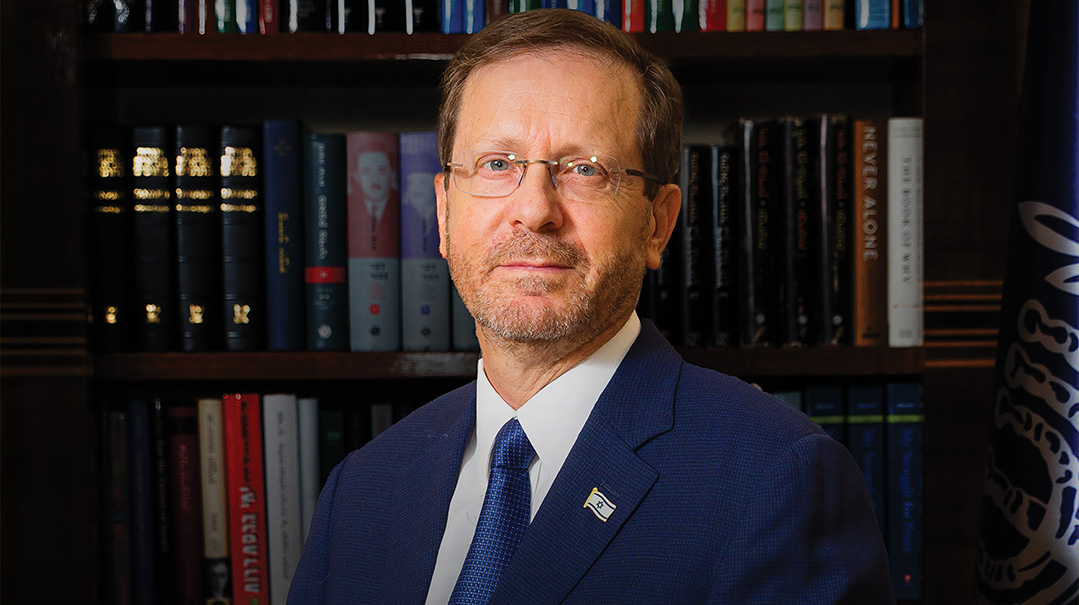
With reporting by Yossi Elituv and Aryeh Erlich
Photos: Elchanan Kotler
While half of humanity tuned in to watch Queen Elizabeth being laid to rest a few weeks ago, one Israeli had a ringside seat.
As one of the more than 500 foreign dignitaries in attendance, President Isaac Herzog had an unforgettable view of the somber pageantry. But unlike other world leaders around him, for Herzog there was something personal about the unfolding scene.
As the son of a British Army officer, grandson of an Irish chief rabbi, and great-grandson of Scotland’s most prominent rav, the event represented the closing of multiple circles with Britain and its rulers.
“Our family traces its lineage to Rashi, and through him to King David via Hillel Hazakein,” says Herzog.
“When my father visited England as Israel’s sixth president in 1984, my parents had the opportunity to dine with Queen Elizabeth at Windsor Castle. During the meal, my mother Aura told the Queen about that lineage. The Queen smiled and related a legend about the British royal family’s own descent from King David.”
It was Israel’s first lady who got in the last word, though.
“Welcome to the family,” was Aura Herzog’s quick-witted response.
“Given that family history,” Isaac Herzog tells Mishpacha, “when I sat there with a kippah as the three Psalms that the Queen herself had chosen for her own funeral were read, it felt like the closing of a circle.”
Spend a few minutes with Israel’s president, and chances are that you’ll hear a story like this about one of his illustrious forebears, rabbinic or political.
This particular royal anecdote, though, is telling for what it says about the family’s own self-image. That’s because the Herzogs are Israel’s closest thing to a royal dynasty — and Isaac himself is something of a princeling.
After leaving the wartime British army, the president’s father, Chaim Herzog, was first an IDF general, then a Labor Party politician before serving as Israel’s president. His younger brother Yaakov was a brilliant Israeli diplomat and a talmid chacham, who was offered the post of British chief rabbi in the 1960s. Chaim’s brother-in-law was the famed foreign minister, Abba Eban.
The current president’s grandfather Rav Yitzchak Isaac HaLevi Herzog — the nascent state’s first Ashkenazi chief rabbi — was revered across the spectrum as one of the gedolei Yisrael, who took a leading role in post-Holocaust rescue and the rebuilding of the yeshivah world.
To top off that formidable résumé, Isaac — widely known as “Bougie,” a childhood nickname — was head of the Knesset opposition as Labor Party leader until 2018, and his brother Mike is now Israel’s ambassador to the United States.
That deep familiarity with the upper echelons of Israeli life and his own emollient nature made the left-leaning Herzog a natural choice for the presidency, despite the country’s growing traditionalism and right-wing orientation.
Since taking office last year, though, he’s emerged as a multi-faceted leader.
With foreign governments reluctant to engage with the weak Bennett-Lapid duumvirate, Herzog stepped up to take a far more active diplomatic role than the normally-ceremonial post allows. Israel’s ongoing opening to Turkey’s volatile President Erdogan, for example, was helped along by an open line between the two presidential offices.
The pictures with politicians displayed on shelves across one wall of the president’s study in the Beit Hanassi residence in Jerusalem’s Rechavia neighborhood tell the tale of a life on first-name terms with world figures.
President Obama’s megawatt smile sits next to a photo of Turkey’s Erdogan with trademark glowering mien, and a polite equivalent from Germany’s former leader Angela Merkel.
But while that political career has been distinguished, there’s no mistaking President Herzog’s passion — his family history.
As he flips between the various seforim and political histories authored by his ancestors, making repeated trips to pluck more volumes off the shelves, he’s not just lost in the past.
For Isaac Herzog, his family’s brilliant yet confounding mix of religion and politics — together with his own admiration for the yeshivah world and pride in secular attainment — is the reality he lives.
It’s why, in the throes of a political crisis underpinned by competing visions of the country’s identity, President Herzog feels that he can be the national reconciler.
“I draw from all the previous generations — particularly my grandfather Rav Herzog — a deep worry about a rending of the national fabric and the need to promote unity.”
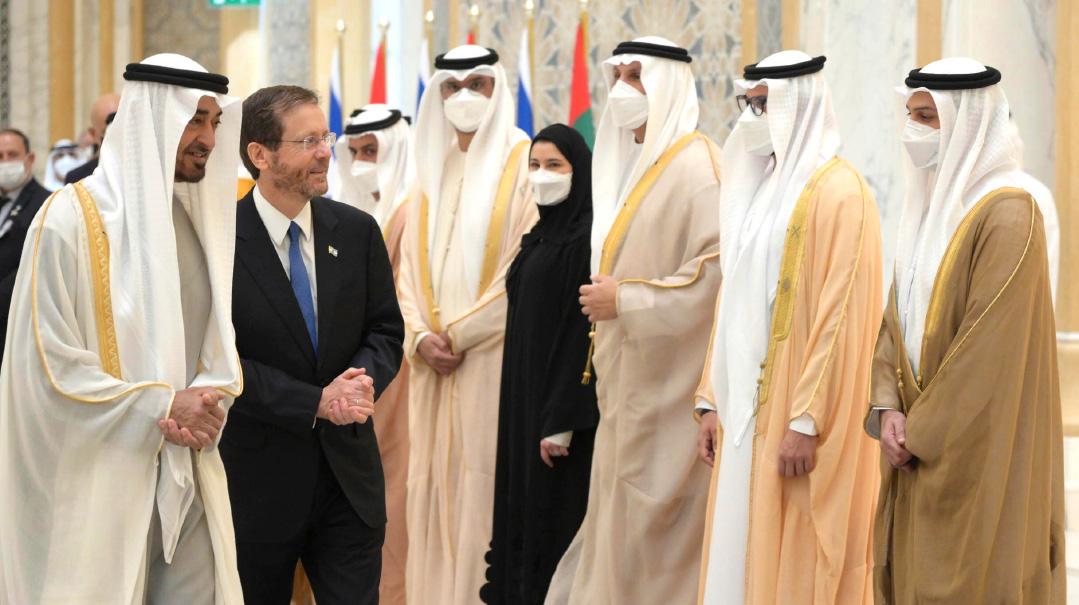
The diplomatic calendar didn’t throw President Herzog off his mourning obligations – and it had nothing to do with PR campaign strategy
Religion Card
If there’s one image that warmed traditional Israeli hearts over the past year, it was the sight of their president’s unshaven face on a state visit to the Gulf.
On January 12th, Aura Herzog — Isaac’s mother — passed away, having seen her son ascend to the same high office that her husband Chaim had occupied. But while he was still mourning, the diplomatic calendar carried on.
Still within the shloshim, a prearranged state visit to the United Arab Emirates — an important Israeli partner since the Abraham Accords the previous year — was pending.
Herzog made the decision to ignore diplomatic niceties and show up in Abu Dhabi with a scruffy aveilus beard.
While Israel’s left-leaning papers reported on the new “look” with bemusement, it was Israel Hayom — the country’s largest right-wing daily — that reported the former Labor party politician’s “moving gesture.”
“Yitzchak Herzog didn’t shave, and said Kaddish in the Muslim country,” the pro-Netanyahu outlet wrote. “That, despite the fact that he isn’t observant, and it would have been easy to find a halachic leniency.”
Just like their stateside colleagues courting the Christian vote, Israeli politicians know when to play the religion card, with well-publicized visits to the Kosel and rabbanim an integral part of political campaigns.
But in Isaac Herzog’s case, reverence for tradition isn’t a PR strategy.
Our meeting at the President’s Residence takes place on Tzom Gedalyah, and the day’s nature is evident in the table devoid of refreshments, both in our honor, and because the president himself fasts.
“The Rosh Hashanah tefillos are engraved on my heart,” he says, humming snatches of the previous day’s tunes which he’d heard at the Beit Knesset Hanassi, which his father, former President Chaim Herzog established, and which is located a few minutes’ walk away on the other side of the neighborhood.
Beit Knesset Hanassi is not the only shul Herzog visits. The mispallelim of Atirat Yitzchak in Tel Aviv’s Tzahala neighborhood (named after British philanthropist Sir Isaac Wolfson) know Isaac Herzog as the Levi who pours water on the hands of the Kohanim for Bircas Kohanim.
That dual role as Levi and president — now in its second generation — actually led to an interesting psak.
When Chaim Herzog was elected president, he asked then Rishon L’Tzion, Sephardic Chief Rabbi Rav Mordechai Eliyahu, if he had to pour water over the hands of the Kohanim, or if it was a degradation of the honor of the presidency.
The ruling was: “When you pray in Tel Aviv, you can pour water over the Kohanim’s hands; when you are in Jerusalem, in your capacity as president — you should refrain from doing so.”
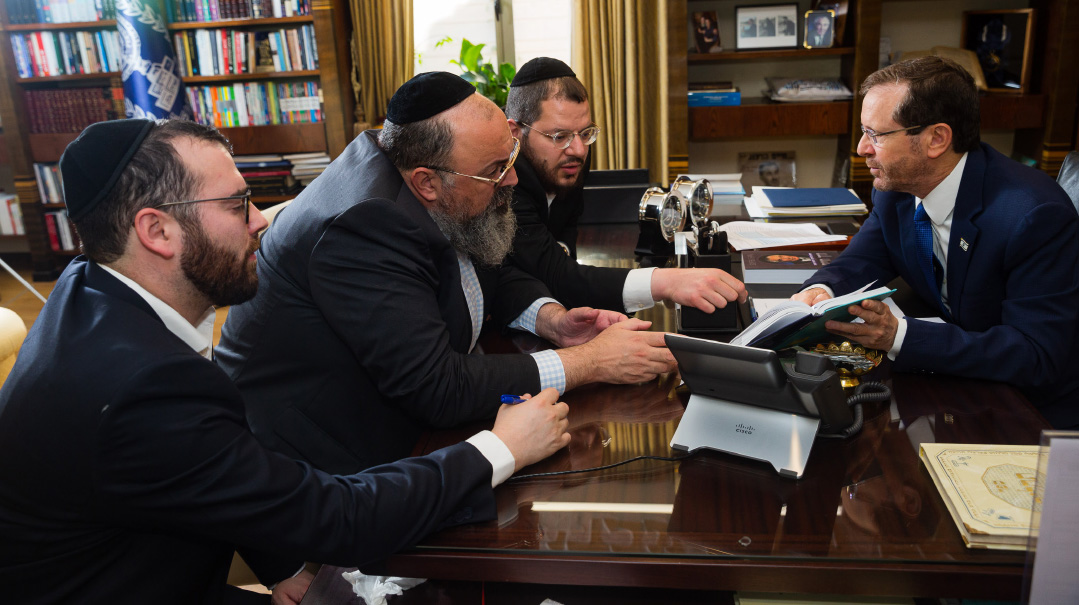
With Mishpacha’s reporters. The office walls tell their own tale
Faith and Fate
That respect for tradition has deep roots. Born in 1960, “Bougie,” as his mother called him, was one of four children. His mother Aura had been born in Egypt to a family who’d been exiled from Jaffa during the First World War.
Despite the slight oriental ring to it, Aura’s maiden name — Ambache — was as Ashkenazi as her future husband’s: The family originated in Russia and Poland, and their name was an acronym for the first letters of “ani ma’amin be’emunah sheleimah.”
The future president was brought up in a home with a rabbinical pedigree dating back to the 17th century and beyond.
His grandfather Rav Yitzchak Isaac Herzog was Israel’s first Ashkenazi chief rabbi and a tremendous gaon, respected by the leading halachic minds of the generation.
The Herzog family originated in Lomza, Poland, where Rav Yitzchak Isaac’s father Rav Yoel Leib was born. A talmid of both Novardok and Slabodka, Yoel was an illui, who raised an equally prodigious child.
After moving to Paris, he served as rabbi of the landmark Rue Pavée shul, in the city center’s Pletzl district.
“When I was with my father on an official visit to France in 1988, we visited Rav Yoel Leib’s shul,” says President Herzog. “My great-grandfather was very broad-minded and was involved in issues far beyond the immediate community duties. For example, when cars began to take to the roads at the beginning of the 20th century, he wrote a book in French against them. He explained why they are dangerous for humanity, expounding on accidents, loss of control, and air pollution.”
While in the French capital, Rav Yoel Leib served as his son’s main teacher. Cut off from the major centers of Torah learning, young Yitzchak Isaac corresponded with the major rabbinic authorities of the day.
When the Ridvaz — the famed Rav Yaakov Dovid Wilovsky of Slutzk — received the young Parisian’s first work of chiddushim, he reportedly called Rav Yitzchak Isaac “the Rabbi Akiva Eiger of our generation” — a scarcely-believable accolade.
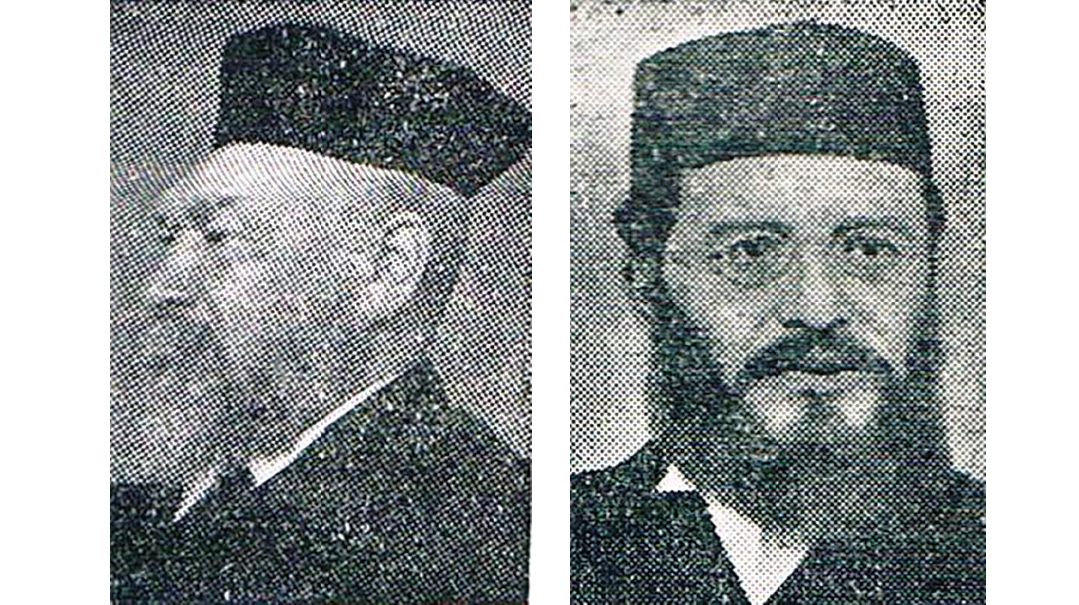
(Left) Rav Shmuel Hillman shared the Herzog family’s twin rabbinic heritage; (Right) Cut off from major centers of Torah learning, Rav Yoel Leib Herzog was the primary rebbi of his son Rav Yitzchak Isaac
Narrow Bridge
In parallel, Rav Herzog developed a secular academic proficiency that set him apart from his colleagues in the classic yeshivos of Eastern Europe.
At the Sorbonne in Paris, he studied the scientific aspects of techeiles, the blue dye used in tzitzis. In 1914, he received a PhD in literature from the University of London for his dissertation on the same subject — the source of the academic qualification that appeared on his headed notepaper later in life, and which graces the front of seforim still in circulation.
Some of his great contemporaries noted that Rav Herzog managed to walk a very narrow bridge and achieve a rare combination of Torah and secular wisdom without becoming negatively impacted by the time spent outside the protective walls of the beis medrash.
“In my opinion it’s a great merit to anyone who can help the great and righteous gaon and tzaddik be elected as chief rabbi,” wrote Rav Yechezkel Sarna, rosh yeshivah of Chevron Yeshiva. “He has fulfilled for himself the words of the Rambam to make the wisdoms and sciences ‘spices’ for the Torah, and he’s a tzaddik without contamination of secular enlightenment.”
Later in life, as chief rabbi of Israel, Rav Herzog supported many young talmidei chachamim, who would receive money for sharing their chiddushei Torah. Among them were Rav Elyashiv, Rav Yisrael Grossman, and Rav Zalman Nechemiah Goldberg ztz”l.
“You could say that my grandfather revived the Torah world after the Holocaust,” says Isaac Herzog. “After the great destruction, there were very few yeshivah students. He enlisted donors, he had a ‘hekdesh’ from which he would help others, and he would also take from his own salary. My grandmother always complained that he took his salary and distributed it. He himself lived a very modest life.”
All that was in the future when aged 31, and still single, Rav Herzog was appointed chief rabbi of Ireland in 1919. It was in that capacity that he met his future father-in-law, Rav Shmuel Yitzchak Hillman.
Raised in Kovno, Lithuania, Rav Hillman was rabbinic aristocracy. He received semichah from the Aderes of Ponevezh and from Rav Chaim Soloveitchik of Brisk and went on to serve as rav of Glasgow, Scotland, and then as a dayan on the London Beis Din.
Preserving that twin rabbinic heritage — Herzog and Hillman — is a major focus of President Herzog’s time.
“Not long ago, 14 volumes of Heichal Yitzchak, my grandfather’s responsa on the four parts of Shulchan Aruch, were published by Yad HaRav Herzog,” the president says animatedly.
“I’m also involved in publishing my great-grandfather’s works, Ohr HaYashar on Bavli, Yerushalmi, and Rambam.”
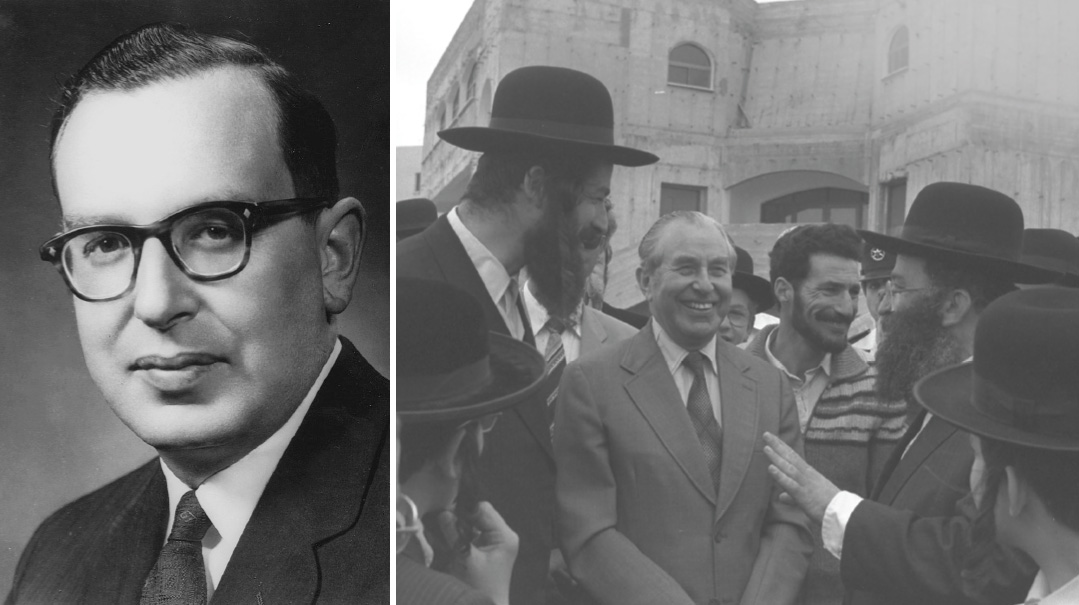
President Chaim Herzog on a visit to Emanuel in 1988. While his life direction wasn’t easy for his father, his brother Rabbi Yaakov David Herzog (inset), advisor to Rav Herzog and a diplomat as well, was torn between two worlds
Labor Movement
Reverence for his rabbinic heritage goes hand-in-hand with the other aspect of the Herzog birthright: a political outlook that comes from growing up on Israel’s left.
Raised in a house of rabbinic leadership, Isaac Herzog’s father Chaim charted his own way, which led to Israeli secularism.
“My father went to learn in Chevron Yeshiva when it was still in Geula,” says President Herzog. “He was a talmid of Rav Moshe Mordechai Epstein and Rav Meir Chodosh.
“Later, he joined the Haganah, and guarded Kibbutz Ramat Rachel in southern Jerusalem. After that, he traveled to study in England, and then World War II broke out. He wrote to his parents that he had enlisted in the British Army to fight the Nazis, and he saw great siyata d’Shmaya.”
While that potted history is accurate, it fails to tell the full story of Chaim’s evolution.
The sixth president’s very name — Chaim, after Rav Chaim Soloveitchik of Brisk — attested to where his father’s hopes and thoughts lay.
In the same vein, Chaim’s younger brother — the future diplomat Yaakov Herzog — was similarly named with rabbinic inspiration. “Yaakov David” was the name of the Ridvaz, whom Rav Herzog considered his rebbi.
Raised in Dublin, Chaim Herzog retained a rich brogue right through his life, and at first followed his father’s path in going to yeshivah.
In 1941, Chaim left what was then Palestine and headed to London to study law before enlisting in the British Army. He served as a tank commander and was one of the first soldiers to liberate Bergen Belsen. He then transferred to intelligence, going on to identify a captured German soldier as SS chief Heinrich Himmler.
How did Rav Herzog take his son’s departure from halachic observance — one that unfortunately was all too typical of the period?
“My father writes about it in his autobiography,” replies Isaac Herzog, painting a picture of children conflicted about their future paths. “It’s clear that there was a gap here between the expectations. My uncle, Rabbi Yaakov, was certified for the rabbinate. He was the advisor of his father, the Rav, but he also took a diplomatic track in life. He was torn between worlds.
“When, in 1966, he was offered to become the chief rabbi of Britain, he vacillated; ultimately, he decided to continue in his position as the director general of the Prime Minister’s Office under Levi Eshkol.
“My father took a different path. When World War II broke out, he wrote to his parents: ‘I’m going out there to save my brothers and sisters from the inferno in Europe and to fight the Nazi tormentor.’ Look at those words — there’s something full of emunah about it.”
That faith was destined to play a part throughout Chaim’s storied career, including his iconic tearing-up of UN Resolution 3379, the infamous “Zionism equals racism” resolution in 1975.
But Chaim’s direction can’t have been easy for a gadol like Rav Herzog, who told his son, “If you are not going to be a rav, then be an IDF officer.”
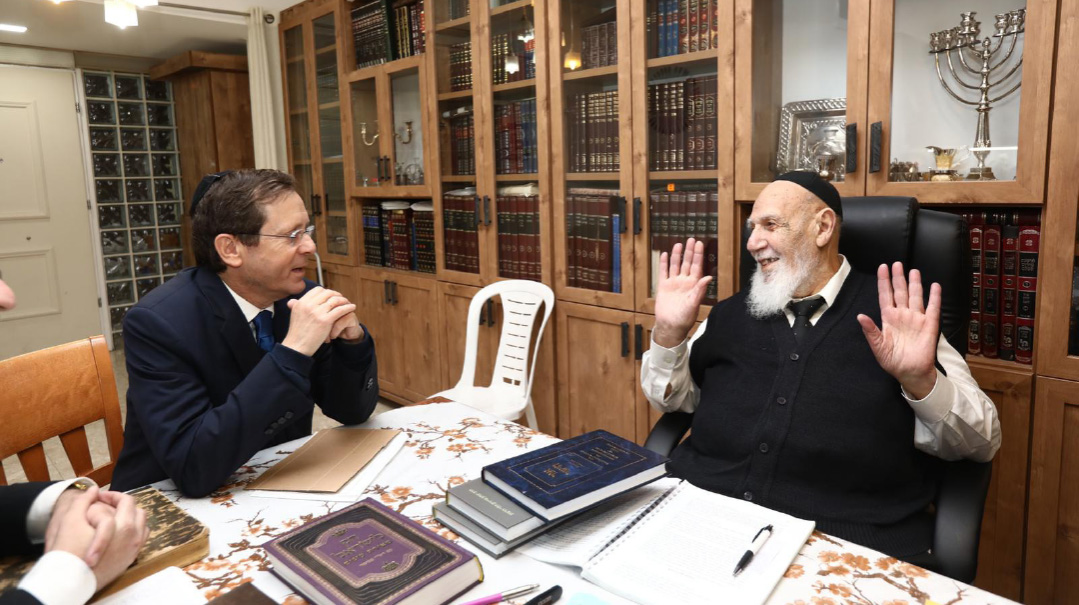
With Chacham Shalom Cohen. His left-leaning politics notwithstanding, President Herzog is seen as a bridge across the Israeli spectrum
Political Pedigree
When Isaac Herzog declared his intention to run for president last year, the campaign quickly took on the air of a coronation.
It was widely assumed that he would trounce the other front-runner, Miriam Peretz, a high-profile educator famous for speaking about coping with loss after she herself lost two sons who died in combat.
That assumption proved correct: Herzog won by a crushing margin of 87 to 26 votes in a poll of Knesset members.
President Herzog’s path to the summit wasn’t just a function of his famous name, though. He’s also a veteran of Israel’s tough political scene himself, emerging from years in the Knesset as a rare figure commanding respect on both sides of the aisle.
His political career began outside the Knesset. He served as secretary of Ehud Barak’s government from 1999 until 2001, and then won a Knesset seat in 2003 as a member of the Labor Party, of which his father had been a member.
Herzog served as minister for departments ranging from Housing to Social Affairs and Diaspora between 2005 and 2009 under the Sharon and Olmert governments.
By 2013, Isaac Herzog was ready for the big time. In that year, he won the Labor Party primary and became head of the Knesset Opposition. His high-water mark came in 2015, when he won 24 seats in the national elections, making his party second in size to Likud, which gained 30 seats.
In the run-up to the election, the Israeli public was served notice that the short, slight Labor Party head lacked the killer instinct needed to bring down Netanyahu in his pomp.
In order to bolster his challenge to Bibi, Herzog agreed to merge his party — which had ruled Israel just 14 years before — with that headed by Tzipi Livni, then foreign minister.
The result nearly put paid to Labor — the historic Avodah party now polls well under ten seats — but for Bougie Herzog himself, bigger things awaited.
Retiring as head of the Opposition in 2018, he was elected chairman of the Jewish Agency, a powerful, if lower-profile job that drew on his connections with American Jewry developed when his father had served as UN ambassador based in New York.
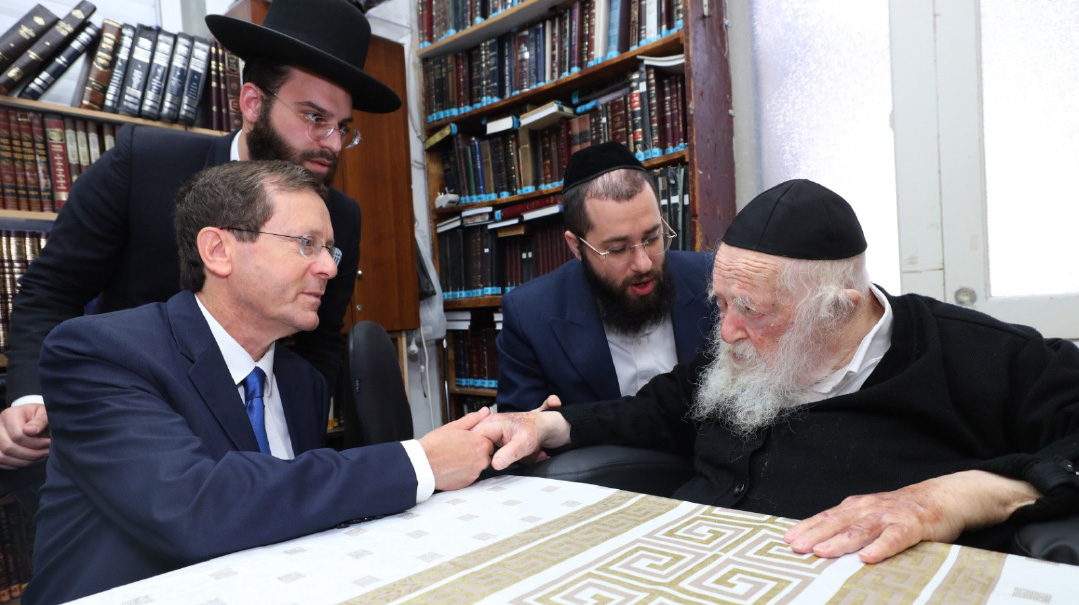
With Rav Chaim Kanievsky
Talking Turkey
Whether President Herzog’s bookshelves provide insights into his character and interests, or merely reflect visitors’ gift-giving habits, is not something that an hour’s interview can clarify.
But the presence of a book named Quiet Diplomat about American philanthropist and presidential advisor Max Fisher could be significant, because the book’s title describes Yitzchak Herzog’s own modus operandi.
Swept into office with the backing of a large plurality of Knesset members, Herzog was widely-seen as the person best suited to bridge the sharp divisions wracking Israeli politics and society.
Support was widespread across the right, where many MKs wanted a break with the previous presidential regime of Reuven Rivlin, who was seen as a none-so-subtle opponent of Netanyahu.
The expectations that Herzog would hold his counsel were justified.
Not so widely anticipated was that the conciliator-in-chief would prove deft in foreign policy matters, particularly facilitating an opening to Turkey, ruled since 2003 by Islamist strongman President Recep Tayyip Erdogan.
Herzog refuses to engage on the subject, which is still a work in progress as Erdogan plans to visit Israel soon — but that very silence is part of his operating protocol.
The background to the recent move goes back to the mid-2000s, when Erdogan sent his country’s relations with Israel into freefall.
Under Turkey’s long-time military and secular rule, links between the two countries had been close, with Turkey buying substantial quantities of Israeli arms and Israelis vacationing in large numbers in Turkey.
But when Erdogan came to power, he spotted an opportunity to gain influence by positioning himself as head of the anti-Israel axis. After Israel’s 2008 Operation Cast Lead in Gaza, his rhetoric worsened, and when Israeli naval commandos killed Chamas-backed Turkish citizens in a violent confrontation attempting to break Israel’s Gaza blockade in 2010, relations plunged into deep freeze.
Over the years, both Turkey and Israel have sent and withdrawn ambassadors, but this year, relations look like they’re finally heading in a positive direction.
When Herzog took office, Erdogan — eager to push an opening with Israel as a way of bringing America back onside for economic assistance — phoned the Israeli president to congratulate him. The call, which reportedly lasted a half-hour, paved the way for further talks.
An opportunity arose a few months later, when Mordi and Natalie Oknin, a couple from Modiin, were arrested in Istanbul and accused of espionage after photographing the presidential palace during their vacation.
When Herzog called to ask for Erdogan’s intervention, he was told that the president would like to use the incident to spur further talks with both Herzog and then-Prime Minister Naftali Bennett.
Those talks indeed happened, and the ball has been rolling toward a reengagement of the two countries ever since.
Clearly, no amount of low-key diplomacy would have helped had Erdogan himself not decided to warm ties. It was also Herzog’s good fortune to reach office with a historically weak government in power.
Israeli law grants the presidency a considerable ceremonial role, dutied with tasks such as receiving ambassadorial accreditation, but the only political role of note is to lead the process of forming a government. Historically, it’s only independently powerful players such as Shimon Peres who have been able to carve out an influential role as president.
Given that context, it’s hard to see a regularly-functioning government allowing the president the same room for independent maneuvering that he’s enjoyed.
But equally, Herzog’s dovish views and well-thumbed Rolodex have made him a listening ear for some foreign leaders, such as Erdogan, who are reluctant to engage directly with right-wing governments.
Oldest Hatred
Whether Israel can patch up its relationship with Turkey or not, dealing with anti-Israel — and anti-Jewish — animus is now part of Herzog’s brief as president.
In a sense, things have come full-circle for him since serving as Diaspora Affairs minister where worldwide anti-Semitism was part of his ministry’s purview.
But with anti-Israel bias now transformed into open Jew-hatred on campuses and city streets across Europe and America, does he not see a turn for the worse?
“I would be cautious about generalizations,” he says. “Not every campus has anti-Semitism. There are Jewish students on lots of very prestigious campuses. At the same time, on some campuses in North America and in certain areas in Europe, there is a trend comprised of two parts: on the one hand, the incitement campaigns of our enemies and the supporters of BDS, and on the other hand, lots of Jewish youngsters who, for the first time, are hearing claims against the State of Israel and don’t know what to answer.
“These trends have a response, including legal avenues. I tell Jews who study on these campuses around the world to be proud of their Jewish identity and to connect to groups that work to battle these trends.
“We need to see anti-Semitism in Europe for what it is,” he continues. “There are European cities where there are thriving Jewish communities. Historically, communities have disappeared for a variety of reasons — it’s not always anti-Semitism that causes these trends.”
These calls for perspective may just be sugar-coating the reality for public consumption, but Herzog seems to think that authorities from Europe to America are genuinely determined to make good on their vows to tackle bigotry.
“Tremendous efforts are being made in a lot of countries to mitigate the anti-Semitism. Recently, I met with the Swiss government on this subject. In England, it’s a top priority. I heard an impressive speech against anti-Semitism delivered by the head of the Labour Party recently.”
That reference to Keir Starmer, current head of Britain’s parliamentary Opposition, is a reminder that under Isaac Herzog as Labor leader, the Israeli left-wing party was forced to denounce Jeremy Corbyn — then head of Britain’s Labour Party. The two parties have traditionally had close links, but the near-blatant anti-Semitism that surfaced under Corbynite rule ruptured those longstanding ties.
“Anti-Semitism needs to be dealt with in a systematic manner,” contends Herzog.
“First of all, in a protective envelope that the states have to give the communities. Second, by enacting laws against anti-Semitism and giving tools to law enforcement, and third, and perhaps most important: education.”
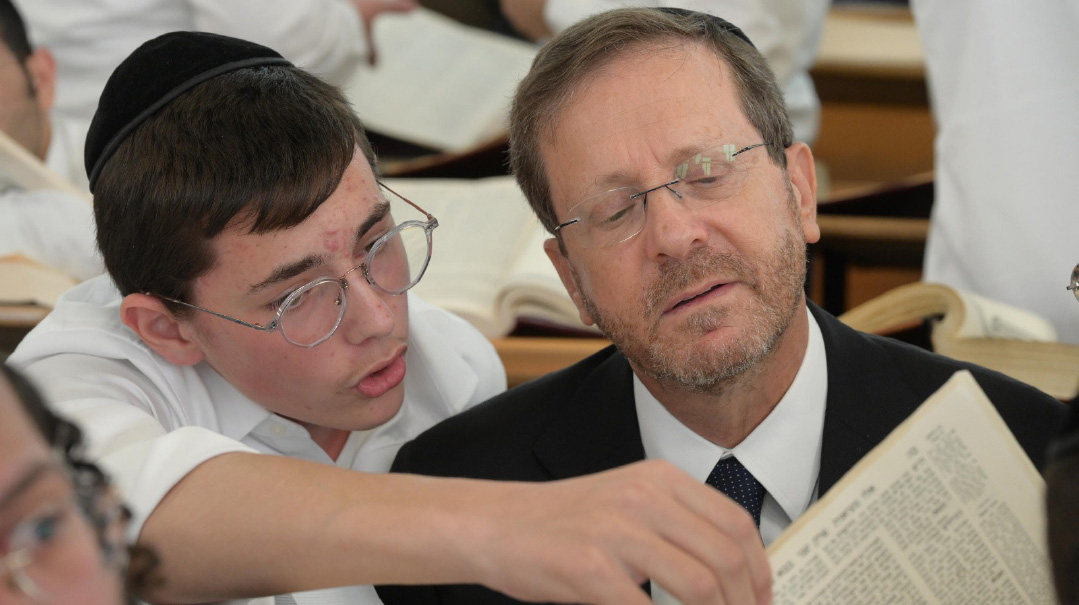
Yeshivah Life
On Rosh Chodesh Elul, Israeli media ran images of an unusual sight. It was the president sitting with students at a cheder, then a yeshivah, and followed by a kollel in Elad, a chareidi city near Petach Tikva.
The photos were noteworthy for one thing: the genuine ease with which Isaac Herzog seemed to fit into the scene.
“I very much enjoyed my time learning b’chavrusa with two of the boys in the yeshivah. We learned the sugya of Shnayim Ochazin dealing with a dispute over ownership of an article — I think it has lessons for our current political deadlock.”
That sharp assertion notwithstanding, President Herzog is not out to score political points when visiting the yeshivah.
The grandson of the great gaon from Lomza seems genuinely content to be interacting with the heirs to his family’s legacy.
That doesn’t mean that he sees eye-to-eye with the chareidi world. He makes a point of mentioning an ongoing controversy over introducing basic secular studies in the cheder system, which briefly pitted Belzer chassidim against roshei yeshivah of the Litvish world.
But President Herzog is not out to lay down the law; he genuinely wishes to see his grandfather’s synthesis continued.
As he returns to his presidential duties trying to reconcile his different worlds, alternating with tending the library of his ancestors’ holy works, he has a moving message.
“If one day, one of my offspring reaches the Torah world and becomes a talmid chacham, I will be happy,” he says. “I’ll expect him to follow the path of my grandfather, Rav Herzog ztz”l, who was a tremendous talmid chacham and was also familiar with the world at large.”
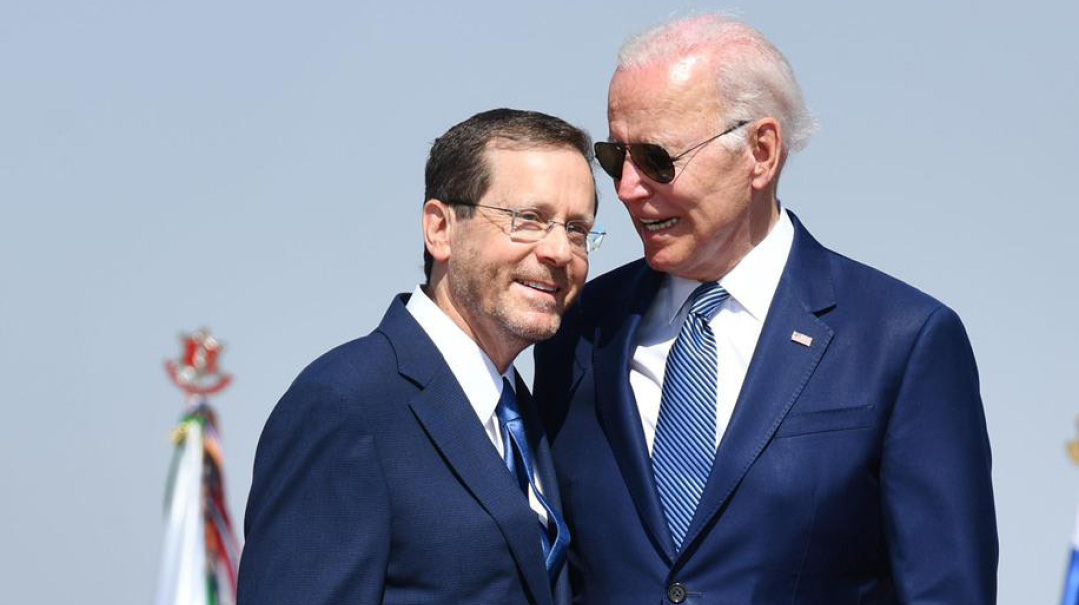
Presidents Herzog and Biden find common Irish ground
Luck of the Irish
It was the height of the bloody Irish campaign for independence from Britain in 1919, when Rav Herzog arrived in Dublin.
His support for the Irish nationalists quickly led to him being dubbed the “Sinn Féin rabbi,” after the Irish independence group.
He befriended Éamon de Valera, one of the revolt’s leaders and the future president of Ireland, when he was on the run from the authorities.
In The Rabbinate in Stormy Days, Shaul Mayzlish’s biography of Rav Herzog, son Chaim recalls witnessing some of the terror.
“I was approximately three years old, and I remember a gunfight on the street in front of our house. From the window I could see a dead body being carted away. It aroused my curiosity, and I went outside. I felt a strong pull on my neck — my mother had run behind me and brought me back inside, commanding me to go to the bathroom in the basement, the most secure room in the house.”
Rav Herzog would go on to use his Jewish connections in America on behalf of the nationalists.
That Irish ancestry has helped President Isaac Herzog find common ground with President Joe Biden, whose Irish forebears are a source of pride.
At the Queen’s funeral, Herzog also bonded with Ireland’s current leader, seated near him.
Ironically, given Rav Herzog’s brave backing for their cause, a century on the Irish nationalists have soured on Rav Herzog’s other big anti-British freedom project: Israel.
Today, Sinn Féin nationalists fly Palestinian flags in Belfast, Northern Ireland, while their Unionist (pro-British) opponents, proudly wave the Israeli flag.
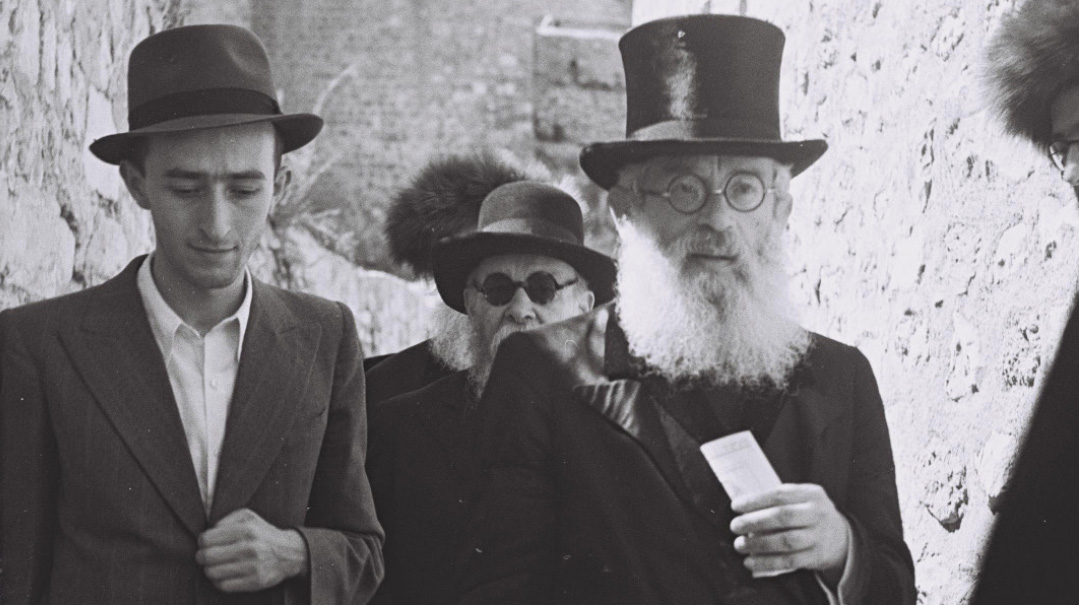
Angel of Mercy
Perhaps the most well-known story about Rav Yitzchak Isaac Herzog involves his post-Holocaust journey to rescue thousands of lost Jewish children who’d been hidden in convents.
Many did not know that they were Jewish, and Rav Herzog went to the Pope and then from convent to convent to plead for the children’s return.
The story goes that in more than one convent, he was told that there were no Jewish children, and even asking the children themselves produced no sign of their Jewishness.
Then, suddenly, Rav Herzog turned to the children: “Shema Yisrael Hashem Elokeinu Hashem Echad!”
Several raised their right hands and covered their eyes.
“These children are Jews!” Rav Herzog cried excitedly. “This is what their mothers taught them when they put them to sleep as little children.”
Is the story about Shema Yisrael in the convent true?
“Rav Herzog crossed Europe for half a year, and he was in almost every country,” says President Herzog. “In some of the places he did indeed say Shema — there are testimonies about it.
“Yesterday, I was in the Beit Knesset Hanassi, and one of the gabbaim there told me, ‘I was a boy when your grandfather returned from his rescue mission and gathered us all together, with dreadful tears.’ ”
(Originally featured in Mishpacha, Issue 933)
Oops! We could not locate your form.







